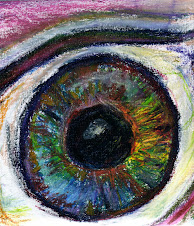As frustrating as it can be for the teacher when a child seems unable to recognize the same easy word in the next sentence, it may be even more difficult for the student. Imagine knowing that you are a very smart person before being confronted with the need to learn to read, and then finding yourself stuck in the lowest performing reading group. How boring! How demeaning! The child cannot figure out how the other students can make the letters stand still on the page, or which of the double lines go with which letter, or which side of the page or word is the beginning, or why the letters and words seem to disappear - that is, if he has learning-related visual challenges. What is even worse, since he has never had any experience of normal vision with which to contrast his own, he cannot explain why he is having trouble. When teachers or parents decide that somehow the problem is related to his behavior or that he is just not trying hard enough or that he is being lazy, the student often responds with even less effort, overt anger, or becomes withdrawn and depressed.
Before assessing that your student is guilty of any of those things, consider that all of these symptoms correspond to a visual condition that can be addressed with simple activities during in-office or home-based vision therapy. Get your child tested by a developmental optometrist who is familiar with vision therapy. Then, follow through on the recommendations that the doctor suggests.
What? Your child passed the vision screening at the nurse's office at school, at the pediatrician's, and, besides, the local eye doctor says he does not need glasses. As the developmental optometrists are fond of saying, "vision is a lot more than 20-20 eyesight." There are ocular motility skills - how the eye muscles work together to point the eyes to a point in space; eye teaming skills - that keep the words single on a page and contribute to an appreciation of depth; accommodation skills - the ability to easily and comfortably change the focus from near to far and back again; a whole cluster of visual perceptual skills - how to interpret the information gathered by the eyes; and visual motor integration - how to use visual information to direct motion. Students can have difficulty with any of these skill sets without needing glasses.
If your student is having difficulty learning to read, if her academic performance does not "match" her expected potential, if school just seems too hard, get a thorough eye examination that considers more than just whether your child needs glasses.
Tuesday, January 6, 2009
Why Can't My Student Remember How to Read Simple Words After Lots of Review?
Subscribe to:
Post Comments (Atom)





No comments:
Post a Comment